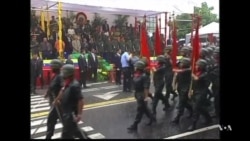During the two months of deadly anti-government protests that have rocked the oil-rich nation of Venezuela, President Nicolas Maduro has accused the opposition of trying to initiate a coup. Though a small number of military officers have been arrested for allegedly plotting against the government, the leadership of the armed forces continues to support the president, at least for now.
Hundreds of students took part in a barefoot march through Caracas, as talks between the government and opposition to end anti-government demonstrations continued with no end in sight.
The ongoing crisis has led to speculation about whether the Venezuelan military will continue to support the socialist government of President Nicolas Maduro if conditions in the country continue to deteriorate.
President Maduro has repeatedly accused the protesters of trying to stage a coup. In March, three air force generals were arrested for plotting against the government. But the military leadership has expressed its loyalty to the embattled president.
Alejandro Sanchez, an analyst with the Council on Hemispheric Affairs, says that is, in part, because Venezuela has become Latin America’s largest weapons buyer.
“In spite of the economy being as bad as it is, the military’s budget doesn’t seem to have been affected. I would say as much because for the past couple of months we keep hearing all about these sales," said Sanchez.
The late President Hugo Chavez cut military ties with the United States in 2005 and replaced most military leaders with officers loyal to him.
General John Kelly, commander of the U.S. Southern Command, says today it has zero military contact with Venezuela.
“Very few officers in Venezuela of any rank have any recollection of working with the U.S. military. Those that do, frankly, I think are, well, they’re probably retired now," said Kelly.
Some critics of the Maduro government say the deteriorating economic and security conditions in the country are testing the limits of the military’s support. Latin America analyst Roger Noriega is with the American Enterprise Institute.
“Maduro is not a military man, and he doesn’t have the confidence, certainly hasn’t inspired the confidence of the military in the last year, and I think the military is very wary about following Maduro over a cliff," said Noriega.
Opposition leader Henrique Capriles says he does not want a coup but is demanding action to address the country’s high crime rate, shortages of goods, and soaring inflation.
Critics of the government do not expect the military to intervene, but, if the situation in Venezuela spirals out of control, they argue the armed forces have a constitutional role to maintain order.
Hundreds of students took part in a barefoot march through Caracas, as talks between the government and opposition to end anti-government demonstrations continued with no end in sight.
The ongoing crisis has led to speculation about whether the Venezuelan military will continue to support the socialist government of President Nicolas Maduro if conditions in the country continue to deteriorate.
President Maduro has repeatedly accused the protesters of trying to stage a coup. In March, three air force generals were arrested for plotting against the government. But the military leadership has expressed its loyalty to the embattled president.
Alejandro Sanchez, an analyst with the Council on Hemispheric Affairs, says that is, in part, because Venezuela has become Latin America’s largest weapons buyer.
“In spite of the economy being as bad as it is, the military’s budget doesn’t seem to have been affected. I would say as much because for the past couple of months we keep hearing all about these sales," said Sanchez.
The late President Hugo Chavez cut military ties with the United States in 2005 and replaced most military leaders with officers loyal to him.
General John Kelly, commander of the U.S. Southern Command, says today it has zero military contact with Venezuela.
“Very few officers in Venezuela of any rank have any recollection of working with the U.S. military. Those that do, frankly, I think are, well, they’re probably retired now," said Kelly.
Some critics of the Maduro government say the deteriorating economic and security conditions in the country are testing the limits of the military’s support. Latin America analyst Roger Noriega is with the American Enterprise Institute.
“Maduro is not a military man, and he doesn’t have the confidence, certainly hasn’t inspired the confidence of the military in the last year, and I think the military is very wary about following Maduro over a cliff," said Noriega.
Opposition leader Henrique Capriles says he does not want a coup but is demanding action to address the country’s high crime rate, shortages of goods, and soaring inflation.
Critics of the government do not expect the military to intervene, but, if the situation in Venezuela spirals out of control, they argue the armed forces have a constitutional role to maintain order.






